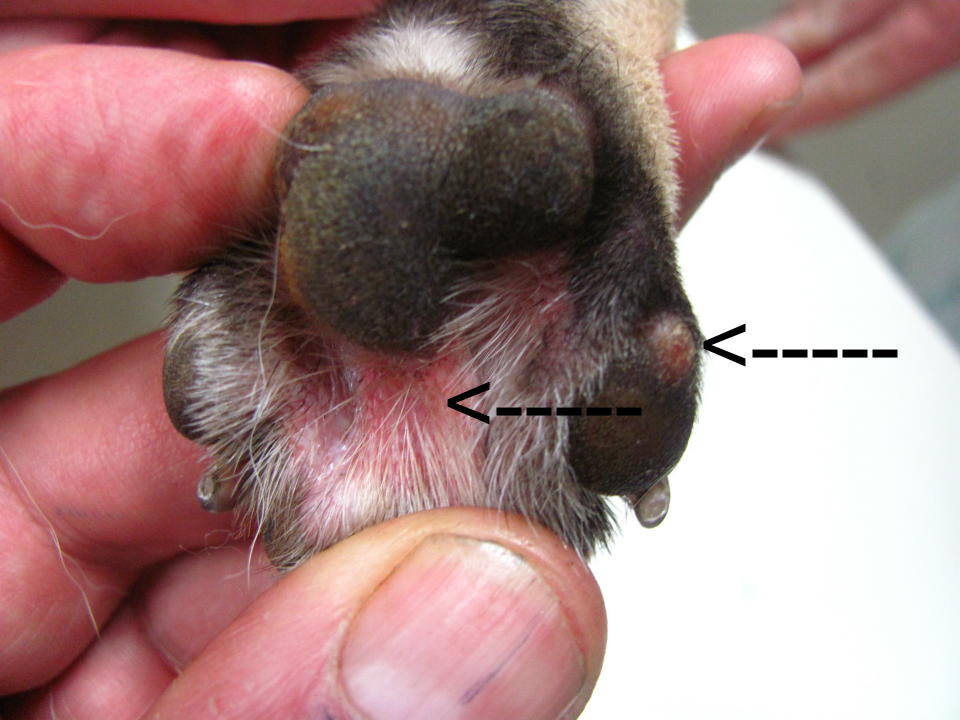Dog Paws Red and Inflamed: What's Got Your Pup Feeling Pawful?
You glance over at your furry companion, peacefully snoozing in the sunbeam. But wait, something's not quite right. You notice their paws – once a healthy pink – now sport an alarming shade of red. Maybe they're even a little swollen. Suddenly, that peaceful snooze seems a lot less serene. What's going on?
Red and inflamed paws in dogs are like a big, flashing neon sign screaming, "Something's up!" Just like we might get a blister from a new pair of shoes, our canine pals can experience paw problems for a whole host of reasons. And let's be honest, nobody enjoys the feeling of irritated, itchy, or painful feet.
While it's tempting to jump to conclusions (flea bites! allergies!), figuring out the root cause of your dog's paw woes is like solving a puzzle. Is it something environmental, like hot pavement or a pesky lawn chemical? Or could it be a sign of a deeper health issue, such as allergies or an infection?
Here's the good news: most cases of red and inflamed paws are easily treatable. But, (and this is a big but!) early detection is key. Ignoring the problem can lead to more serious complications, turning a minor irritation into a major pain (literally!) for your pup.
So, let's ditch the guessing game and get down to business. We'll walk through the potential culprits behind your dog's paw problems, how to soothe their discomfort, and when it's time to call in the canine medical cavalry (aka, your veterinarian). Get ready to become a paw-sitive pro at keeping those precious paws happy and healthy!
Potential Causes of Red and Inflamed Paws in Dogs
There are numerous reasons why your dog might be experiencing red and inflamed paws. Here's a breakdown of some common culprits:
Allergies: Just like humans, dogs can be allergic to various substances, including pollen, mold, dust mites, and even certain foods. These allergens can trigger an inflammatory response, leading to red, itchy paws.
Environmental Irritants: Hot pavement, rough terrain, ice, snow, and chemicals used in lawn care can all irritate your dog's sensitive paw pads.
Parasites: Fleas, ticks, and mites can cause intense itching and irritation, leading to redness and inflammation.
Infections: Bacterial, fungal, or yeast infections can develop between the paw pads, causing redness, swelling, and discomfort.
Other Medical Conditions: Certain medical conditions, such as autoimmune disorders or endocrine disorders, can also manifest as paw problems.
When to Worry: Recognizing Signs of a Serious Issue
While many cases of red and inflamed paws resolve with simple home care, it's essential to know when to seek veterinary attention. If you notice any of the following signs, contact your veterinarian immediately:
* Excessive licking or chewing of the paws
* Open sores, bleeding, or pus
* Foul odor coming from the paws
* Lethargy or loss of appetite
* Limping or reluctance to walk
Soothing Solutions: Home Remedies for Mild Cases
If your dog's paw irritation seems mild, you can try some home remedies to provide relief:
* Cool Water Soak: Soaking your dog's paws in cool water for 5-10 minutes can help reduce inflammation and soothe irritation.
* Oatmeal Bath: Adding unflavored, colloidal oatmeal to your dog's bath can provide soothing relief for itchy skin.
* Apple Cider Vinegar Rinse: A diluted apple cider vinegar rinse (1 part ACV to 10 parts water) can help balance the skin's pH and reduce inflammation.
Remember, these home remedies are meant for mild cases. If your dog's symptoms worsen or persist despite home care, consult with your veterinarian.
Prevention is Key: Protecting Your Pup's Precious Paws
Here are some proactive steps you can take to safeguard those precious paws:
* Paw-sitive Hygiene: Wipe your dog's paws with a damp cloth after walks, especially during warmer months or in areas treated with chemicals.
* Trim Those Nails: Regular nail trims prevent painful ingrown nails and reduce the risk of scratching.
* Paw Balm for the Win: Applying a protective paw balm before walks can shield those pads from harsh elements.
* Choose Walking Surfaces Wisely: Avoid hot pavement, rough terrain, and areas treated with chemicals whenever possible.
Your dog's paws are their connection to the world, allowing them to explore, play, and experience life to the fullest. By understanding the causes of paw problems and taking steps to prevent and address them promptly, you can ensure your furry friend enjoys countless happy adventures on all fours.
Po box 1111 charlotte nc
Defusing the dilemma red wire or blue wire
Daily reflections finding guidance and purpose














